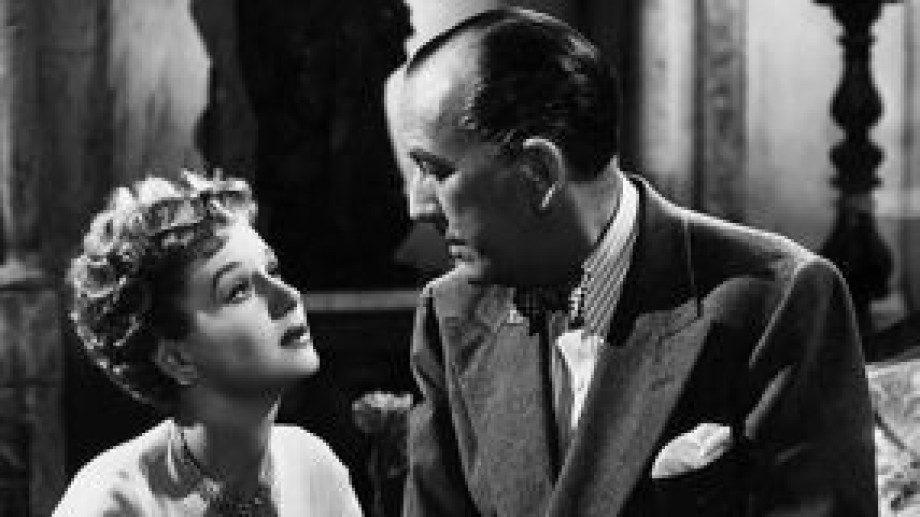
Noël Coward / Images courtesy of the Kobal Collection
“Why am I always expected to wear a dressing-gown, smoke cigarettes in a long holder and say 'Darling, how wonderful'?” Sir Noël Coward incessantly joked about keeping up his public appearance as if it were a chore invented for him by others. Coward told Time magazine that for his 70th birthday festivities he'll just be “sitting there wearing my tribute-accepting face, which shows me proud but unspoiled by my own success … a face I have used since 1920.” That face has graced dozens of Broadway playbills, film posters and the silver screen, itself, finding its way to the Film Society of Lincoln Center this weekend.
In conjunction with the New York Public Library exhibition “Star Quality: The World of Noël Coward” and “Noël Coward in New York,” our Coward on Film series will show eleven of Coward's beloved films at the Film Society this weekend (May 11 – 13) including Blithe Spirit (1945), Private Lives (1931), The Scoundrel (1935) and This Happy Breed (1944). Don't miss the special event screening and discussion of Carol Reed's Our Man in Havana (1959), starring Coward. Told that he “stole” parts as a character actor in other people's films, Coward responded “Yes, but it was only petty larceny.” Follow such larceny with Coward scholar and series programmer Barry Day as he leads a talk highlighting Coward's on-screen work.
But that's not all! Don't miss one of the most romantic films of all-time Brief Encounter (1945) on May 12. Directed by David Lean (Lawrence of Arabia, Doctor Zhivago) and starring Celia Johnson (This Happy Breed) and Trevor Howard (The Third Man), this restored 35mm melodrama follows a suburban housewife and affectionate doctor who meet at a train station, tempting one another with love, excitement and travel. The black-and-white photography, along with the use of Sergei Rachmaninoff's Piano Concerto No. 2, orchestrate the world of missed opportunities and instantaneous love.

Blithe Spirit (David Lean, 1945)
If you don't want to risk getting a little dusty, check out Ernst Lubitsch's comedy Design for Living (1933). Competing with the censor, this hilarious ménage à trois-themed story stars Frederic March, Gary Cooper and Miriam Hopkins. Unfortunately for Coward's witty banter and cheeky expressions, only one original line remained in Ben Hecht's adaptation for the screen, which Coward claimed was “Pass the mustard.” But don't let the censors get you down, Design for Living has that comedic Lubitsch touch—always worth watching.
Coward's most well-known film adaptations came at the height of World War II, and in 1942 he co-directed and starred in In Which We Serve, a story of a warship's launching and demise. Taking on the leading role of Captain Kinross, Coward left some of the directing up to David Lean, but wrote the script and composed some of the score himself.
From the start of Coward's career he was dolling out his charm on actors, directors and writers, beginning with D.W. Griffith in Hearts of the World (1917) in which, as an extra, he convinced Griffith that he should push a wheel barrow toward the camera instead of away, as Griffith originally asked. He just had what Time magazine called “a sense of personal style, a combination of cheek and chic, pose and poise.”

Our Man In Havana (Carol Reed, 1959)
Create your own double feature!
Select any two films in the series for just $15 Members, Students & Seniors / $20 General Public. Please note: “Coward the Actor + Our Man in Havana” program on May 13 is not included in the double feature package. Maximum of one ticket per film. Minimum purchase of two films required.
Free Guided Tours:
During the Coward on Film series, curator Brad Rosenstein will offer two guided tours of the concurrent New York Public Library exhibition “Star Quality: The World of Noël Coward,” featuring an extensive selection of manuscripts, paintings, set and costumes designs, costumes, and personal memorabilia from the Coward archive. The tours will be offered on Friday, May 11 at 12:45pm and Saturday, May 12 at 12:30pm at the Donald and Mary Oenslager Gallery of the New York Public Library for the Performing Arts, 40 Lincoln Center Plaza (next to the Met Opera).



